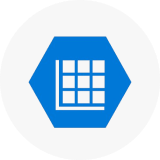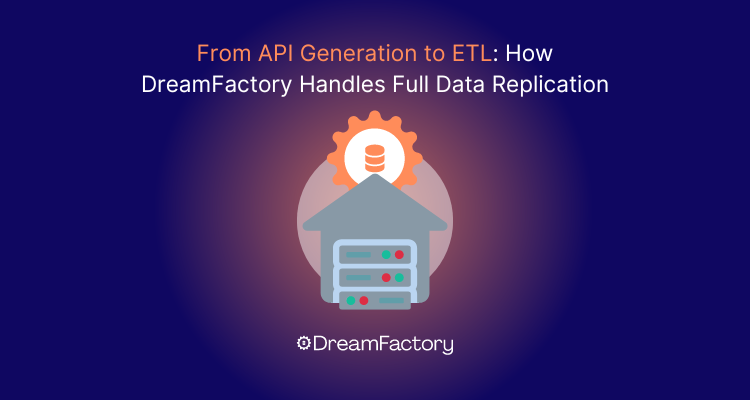While many API tools are available on the market—such as enterprise service buses (ESBs) like Apigee and MuleSoft, or low-code solutions like Hasura and CData—few offer the level of flexibility that DreamFactory does. A recent project underscored just how dynamic this lightweight, enterprise-ready API generation tool can be. In this article, we'll dive into this unique project and explore how DreamFactory proved to be much more than just an API generator.
Here's the key things to takeaway from this article:
- DreamFactory supports scripting in PHP, Python, and Node.js, allowing users to customize auto-generated APIs and create secure, hand-programmed APIs tailored for specific data integration needs.
- The project involved capturing data from a payment processor's API, transforming it, and loading it into an in-house SQL Server, providing real-time access without constant API calls.
- Traditional ETL tools were considered too expensive, so DreamFactory was used as a cost-effective alternative, enabling seamless data replication through its scripting and API generation capabilities.
- A custom PHP script was developed to handle API pagination, authentication, and data loading into SQL Server, utilizing DreamFactory's ability to easily create API connections and schedule data syncs.
- DreamFactory excels as an ETL tool by offering flexibility, an API-first approach, simplified setup, built-in security features, and the ability to support hybrid data integration across multiple sources like REST APIs, SQL, and NoSQL databases.
What Was the Project About?
Before we delve into the specifics, let’s start with what made this project possible: scripting. DreamFactory supports three scripting languages—PHP, Python, and Node.js—allowing users to customize auto-generated APIs. Additionally, it enables the creation of hand-programmed APIs with built-in security features, making any custom API "showtime ready."
The project in question involved capturing data from a payment processor and loading it into an in-house SQL Server warehouse. The goal was to empower the analytics team to run real-time processes without needing to fetch data from the third-party API every second. This approach provided the company with a solution they had full control over, reducing dependency on external systems and minimizing latency.
“But couldn’t they just use an ETL tool?” you might ask.
And you wouldn’t be wrong—except for one critical factor: budget.
If you’ve ever looked into ETL tool pricing plans, you’ll know they get complicated quickly. Most ETL tools come with high minimum spends that can escalate rapidly, especially when syncing tens of millions of records multiple times a month. This project would have been prohibitively expensive using traditional ETL tools. This is where DreamFactory shined—not just as an API generation tool, but also as a lightweight, cost-effective ETL alternative.
How Did They Do It?
Working together, we created a custom PHP Scripted API that could seamlessly invoke the payment processor's API, manage their unique authentication, and push the data to an SQL Server table. For a full breakdown of the code and to try it yourself, check out the repo here.
At a high level, the process involved invoking the payment processor's API and checking for additional records in the response since the API was paginated. If more records were available, the script would continue fetching data until all records were retrieved. Once the data was in hand, the next step was to load it into SQL Server. We configured a new SQL Server API in DreamFactory, enabling us to call it from our scripted service. After setting up this API in just a few minutes, we referenced it in our script to POST the data to our newly created table.
And just like that, the job was done! The sync can now be scheduled to run on a monthly basis using DreamFactory’s built-in scheduling feature, allowing the team to access payment data from SQL Server without worrying about cost, latency, or other hurdles.
DreamFactory as an Alternative to ETL Tools
DreamFactory offers a compelling alternative to traditional Extract, Transform, Load (ETL) tools like Fivetran, Informatica, or Talend, especially for developers and organizations seeking a cost-effective and flexible solution. While traditional ETL platforms provide robust data integration and transformation capabilities, they often come with substantial licensing fees, complex pricing models, and infrastructure overhead that can escalate quickly—especially when dealing with large datasets or frequent data syncs.
Here are a couple key benefits DreamFactory has over traditional ETL tools:
Customization with Scripting
DreamFactory’s scripting capabilities in Node.js, Python, and PHP give developers the flexibility to create highly tailored ETL workflows without being confined to predefined connectors or data pipelines. This allows for custom transformations, data filtering, complex conditional logic, and error handling within the API-based ETL processes.
Traditional ETL tools may abstract these processes into visual tools or predefined workflows, but they can often limit flexibility and introduce complexity when customization is required. With DreamFactory, developers can fine-tune every step of the data pipeline.
API-First Approach
Unlike most ETL tools that focus primarily on moving data between predefined sources, DreamFactory is API-first, enabling it to act as a bridge between diverse data sources like REST APIs, SQL databases, NoSQL databases, and SOAP services. It can expose any data source as a secure API and automate the transfer of data across systems with built-in security and access controls.
This API-first design means DreamFactory can easily integrate with modern, cloud-native applications or microservices architectures, where traditional ETL tools might struggle due to their more rigid nature.
Simplified Setup and Management
DreamFactory allows developers to set up API-to-database connections within minutes using its auto-generated APIs. Traditional ETL tools can require complex configuration and ongoing maintenance, especially when dealing with changes in data schema or source systems.
DreamFactory’s easy-to-use interface and auto-generated documentation simplify the management of API-based data pipelines, reducing the need for specialized ETL expertise.
Built-in Security and Role-Based Access Control (RBAC)
DreamFactory offers built-in security features like OAuth, API keys, JWT authentication, and Role-Based Access Control (RBAC) to ensure data transfers between APIs and databases are secure and controlled. Traditional ETL tools often require additional layers of security configurations, sometimes involving external security tools or systems.
By managing both the API access and data replication within the same platform, DreamFactory provides a unified security approach, which reduces the complexity of managing data security across multiple tools.
Hybrid Data Integration: Combining API and Database ETL Processes
Hybrid ETL workflows leverage both API access and direct database connections, allowing for more flexible and real-time data synchronization. With DreamFactory, developers can integrate multiple data sources—such as REST APIs, SQL databases, and NoSQL databases—into a unified ETL process. DreamFactory’s ability to auto-generate APIs from databases and interact with external APIs simplifies data extraction, transformation, and loading across different systems.
For example, DreamFactory can pull data from an external API (e.g., a third-party service) and directly push that data into an SQL database, while also supporting more complex workflows like fetching data from a NoSQL database and transforming it to fit a relational database schema. This hybrid approach allows for real-time data access and synchronization, blending API-driven automation with the power of direct database connections.
Why Choose DreamFactory for Data Replication?
DreamFactory stands out not only for its flexibility and cost savings but also for its ease of use. With built-in support for multiple scripting languages and robust API management features, developers can quickly create customized data workflows that are secure, scalable, and tailored to specific business needs. This makes DreamFactory an ideal choice for organizations looking to streamline their data integration processes without incurring high costs.
Want to give it a try? Book a call with an engineer to get DreamFactory spun up in your environment.
Frequently Asked Questions: API Generation to ETL
1. Why use DreamFactory instead of traditional ETL tools like Fivetran or Informatica?
DreamFactory offers a cost-effective and flexible alternative to traditional ETL tools, which often have high licensing fees and complex pricing models. Its API-first approach, scripting capabilities, and built-in security features allow for customized data workflows, making it ideal for real-time data replication without the overhead and limitations of traditional ETL solutions.
2. How does DreamFactory handle data transformation in ETL workflows?
DreamFactory allows you to use scripting languages like PHP, Python, and Node.js to write custom logic for transforming API data. This flexibility lets you map and format data to fit your target database schema, perform data filtering, handle conditional logic, and manage error handling—all within the same platform.
3. Can DreamFactory handle paginated APIs in ETL processes?
Yes, DreamFactory’s scripting capabilities can handle API pagination. You can write scripts that automatically fetch all pages of data from an API and continue the process until the complete dataset is retrieved. This is crucial for efficiently managing large datasets during data replication.
4. Does DreamFactory support real-time data synchronization?
Yes, DreamFactory supports real-time and scheduled data synchronization through its scripting and API management features. You can set up custom scripts to pull data from APIs or databases and load it into your target database at defined intervals or in response to specific events.
5. How secure is data replication with DreamFactory?
DreamFactory includes built-in security features like OAuth, API keys, JWT authentication, and Role-Based Access Control (RBAC). This ensures that data transfers between APIs and databases are secure, reducing the complexity of managing data security across multiple systems.
6. Is DreamFactory limited to specific data sources for ETL workflows?
No, DreamFactory is versatile and can connect to a wide range of data sources, including REST APIs, SQL databases, NoSQL databases, and SOAP services. It auto-generates APIs from these data sources, allowing you to integrate them into a unified ETL process.
7. How does DreamFactory simplify API-to-database integration?
DreamFactory auto-generates APIs for databases and external services, which can be easily integrated into custom scripts for data extraction, transformation, and loading. This process can be set up in minutes through DreamFactory’s user-friendly interface, reducing the need for specialized ETL expertise.
Kevin McGahey is an accomplished solutions engineer and product lead with expertise in API generation, microservices, and legacy system modernization, as demonstrated by his successful track record of facilitating the modernization of legacy databases for numerous public sector organizations.
























 Blog
Blog


